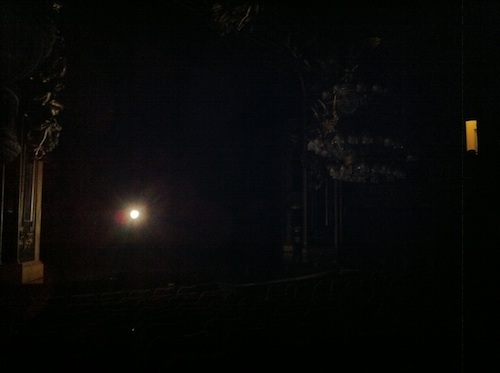15 years of Phantom
June 3, 2010
Today I celebrate 15 years working on the Broadway production of The Phantom of the Opera, at the Majestic Theatre in New York.
Humble Beginnings
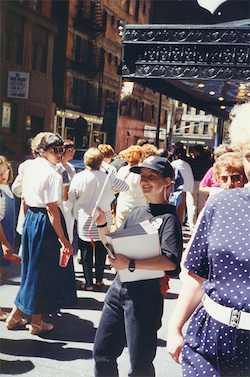
I began my Phantom career as a merchandiser, on the first available shift following my 16th birthday (which is the age at which one can hold a job in New York). I was a sophomore in high school. For the first year, I primarily sold programs in front of, and inside the theatre. This is the only picture I can find of me selling, in the summer of '95, but I know there are better ones somewhere. Maybe someday I'll find them.
The year after that, when I was 17, I worked the merchandise booth in the lobby, selling dozens of items with masks on them, and learning a little bit of foreign languages -- at least enough to be able to say the names of items and prices in Spanish, Portuguese and Japanese, which were the vast majority of our audiences in the mid-to-late '90s. When I turned 18 they began training me as a manager, and from that point on, I would sub in for individual performances and cover vacations for the manager at Phantom, as well as at other theatres.
Throughout my college years I worked merchandise seven days a week, usually at Phantom. In my last semester of college I briefly attained the pinnacle of my Phantom merchandising career, having few enough classes to be the full-time manager for a couple months before being transferred to open Jane Eyre, which turned out to be a lot of fun as well.
In addition to selling merchandise while in college, I also decided to pursue stage management as a career instead of directing. At the instant I made that decision, I had the support of Phantom's stage management team, who used me as an assistant on outside benefits, and eventually let me train on the deck, and at least theoretically learn to call the show. I should mention I had by this point seen the show many hundreds of times. I don't mean poked my head in for a few scenes here and there, I mean nearly 500 complete performances, studying every aspect of the show. So admittedly I had an advantage in all of my future studies as a Phantom stage manager. And I make a very disappointing potential victim in the pick-a-random-line-in-a-"Managers"-scene-and-make-the-person-tell-you-the-next-line game.
Graduating from college meant I had to give up my full-time salaried position in merchandise to be a poor and unemployed stage manager, but I continued working isolated shifts to earn extra money any time I didn't have stage management work on a given night. As a professional stage manager, I worked my way around the non-Equity circuit, picking up many of my initial jobs on recommendations from people I had worked with while training at Phantom. Finally after three long years, I got my Equity card, and from that point everything took off. When the tour I had booked was finished, I marched myself into the stage management office and announced I was home, and an Equity member. I was told, "well we've got someone training this week, but you can start next Monday."
My Broadway Debut
Having been waiting for this moment for the past four years, I had retained pretty much everything from the training I had received periodically, although the show itself had changed a bit and there were some new things to learn. At my first show, I followed my trainer on the deck. On the second show I ran the deck with my trainer watching. On the third show I ran with the trainer watching again, and that night I did my first solo performance. I soloed for a couple more days to give me some time to get comfortable, and then finally, after all those years, I was given the chance to choose my calling script. When I had started learning the show, there was only one script -- something made on a typewriter in 1987. In the intervening years, one of the subs had made it a project to create a new electronic script, with cute graphics, where all the cues were in the right places (and in some cases, in the right order for the first time!) for the way the show ended up being called. Being a big fan of the history of the show, I had always known I wanted to call from the original script, which incidentally was the script I had always studied. So I said I wanted the original script, and was given my own copy. I had gotten some pretty serious training two years earlier, and had retained a lot of it, but with my own copy to take notes in, I began studying the calling in-depth.
I watched everyone call the show and listened to all their ideas, I sat in the office and watched the show on the monitors while listening to the headset feed, pestering whoever was in the office that day with my questions and requests for clarification. I would call the show out loud, snapping my fingers to indicate I was throwing a switch. Sometimes I would be left to my own devices, sometimes whoever was in the office would have an ear open to what I was doing, and would say, "very good," or offer advice.
I didn't really ever have any specific individual training time, which I never realized until it was time for me to prove I was ready to call the show. At Phantom that's done by coming in early and sitting at the calling desk, and calling the entire show along with an audio tape, with the PSM watching to make sure you do everything just right. In my case, it was scheduled over two days -- Act One one day, Act Two the next. In my journey through Act One, Craig only stopped the tape once. I had gotten finger-tied on one of the more complex scene changes. What I had done was ugly, the result of a poorly planned switch-throwing pattern, and he wanted to correct it so it was easier and less prone to mistakes. What I had done was inelegant and nerve-wracking for sure, but I had still called all the cues correctly. When we got to the end of Act One, Craig stopped the tape player and said, "You're calling the show Tuesday night. The whole show." Sometimes people call only the first act while they're still training. I was thrilled, but also scared out of my mind, because he made this declaration without seeing my Act Two, and I was much less comfortable with it than I was with Act One! But my trial of Act Two went off without a hitch the following afternoon, so the date was set.
What I remember about that weekend (I think it was a Thursday and Friday when I had my test) was that it was the only time in my life that I have been truly afraid to die. That weekend I would look both ways very carefully when crossing the street, afraid that I was going to get hit by a bus before getting to call the show.
The night before I called, I was given my choice of how I wanted to spend the show. There are a lot of ways to train -- watching from the calling desk, sitting in the office and calling aloud with the show, sitting at the sound board on headset, sitting in a box, etc. I was completely confident that I knew what to do, I just wanted to be alone with the show, without influence from how anyone else was calling it, because it was too late for that. I needed to have confidence in my own way of calling. So I watched from the sound board, off headset, with just me and my script and the show. The experience got me in the right frame of mind that I was able to picture myself having called that show, and see that everything was happening.
On April 6, 2004, I called Phantom for the first time. The main thing I remember about it was the feeling that the show was running without my input. Everything looked so much like what it always looked like that there was no feedback that my calling it had anything to do with it. Of course, had I screwed up, it would have been quite obvious! But it made me very nervous to not feel the connection between what I was doing and what was happening on stage. There was one specific cue in the Journey (the title song) that I had asked for permission to do my own way, which was several beats ahead of where it was marked in the book, and where everyone else called it. In my mind, backed up with my research of the original blocking book, I felt it was restoring the original look of the cue, and I was given permission to call it that way. That was the first thing that I could see that was a clear indication that I was determining the course of the show. Probably because of this, by "Music of the Night" I was beginning to relax, and the experience started to bear some resemblance to something I had done before in my career. Of course I was extremely nervous, but at least I felt like I was calling a show, albeit a very high-pressure one. And I tried not to let on, to the cast, the crew, or the audience, that I had never called a Broadway show before, or an Off-Broadway one, for that matter! I think I did a pretty good job, as I have always been told that people find my voice calming when they're on headset, including actors who can hear the call of the show from some of the open biscuits around the theatre. I found that hysterical, since my M.O. that night was to call the cue, switch off my mic, breathe out deeply, collect my breath control, turn on the mic, call the next cue, turn off the mic, begin breathing heavily again... Apparently it worked. They thought I was completely relaxed, when the truth is every second that my mic wasn't on I was practically hyperventilating! That's also when I learned an important life lesson about the impact the demeanor of even the most inexperienced stage manager can have on even a veteran cast and crew.
In addition to subbing, I continued to sell merchandise on the show for extra money. There was one day in particular that I think is the definition of theatrical employment irony: I called the show at the matinee and was selling programs on the street in the evening. I continued to flip-flop from the most lowly to the most influential position in the building from night to night, until the last few years, when my stage management career has been stable enough that I don't need to do anything other than stage manage to survive. I haven't done merchandise in a few years, but I would do it again as a favor, or just for fun, under the right conditions.
Today
For the last six-and-a-half years, I have subbed on Phantom, some years more often than others, depending on the comings and goings of other people, and my own comings and goings in my career. While being incredibly rewarding, inconceivably high-paying work when you can get it, it's still a temporary, very unpredictable job, and not one that leads anywhere in and of itself. In pursuit of an actual stage management career I've had to work tiny jobs for crap pay, and turn down many nights on Broadway. There was a show I did for eight weeks of full-time work, and in the last two weeks of the run I was offered six performances at Phantom. Because my show conflicted with those performances, I lost more money on those six days than I made from the entire eight-week contract. On the other hand, sometimes I'll be very available and get no work. Such is the life of a sub, and such is why one has to pursue jobs that will increase one's connections and overall career experience, even if in hindsight it's obvious it wasn't worth it in a particular situation. And thus, I work a lot as a PSM, I have a ton of health weeks I don't even need, but I don't get to spend very many nights a year doing my absolute favorite thing in the world, which is calling Phantom and showing 1,600 people my best possible recreation of the stagecraft that I have been so inspired by for most of my life.
The thing I most treasure about calling the show is that it means something very personal to me. I sat in that theatre at the age of 12, and during the Overture, quite out of the blue, realized that I wanted to spend my life in musical theatre. Many things have changed between then and now, in my life and in my understanding of who I am and what my goals are, but two things have remained constant: I still want to spend my life in musical theatre, and the Phantom Overture still happens 8 times a week at the Majestic Theatre. The distance between my 12-year-old self watching the Overture for the first time, and my 24-year-old self or my 31-year-old self calling that Overture really only feels like about 30 or 40 feet. I can feel exactly where that seat is through the proscenium, every single time I call the Overture -- it's almost like some kind of magnetic force is there, trying to pull me out to see the show as I saw it then. And I'm usually never happy with where I am in life, but right before I call my favorite cue (where the Hannibal drops start to rise), I take the measure before the cue to kind of give my inner self a slap across the face and say, "Forget everything else, pay attention to where you are. Watch yourself call this cue -- don't look at the monitor, look at the stage -- watch what it does. That's why you're here." Whatever "here" might mean at the time -- alive, a stage manager, living in New York, broke, underpaid and overworked, unemployed -- and no matter what's bothering me, no matter how seldom I get to call that cue, the fact that I'm calling it at all is a sign that I'm still somewhere on the right path, maybe even at the destination all along.
Memories
Special Events
Easter Bonnet, 1997
I didn't get a chance to scan as many old photos as I wanted to (we used something called "film" when I started working), but I will add them when I'm able to.
The first big event I participated in with the show was the 1997 Easter Bonnet Competition. I was the Asst. Bonnet Designer, assisting my co-worker Mary, who was a professional milliner. Our skit was a "trailer" for the Phantom movie. Now it's not as funny because the movie finally got made, but in '97 there was still talk of people like Madonna and Michael Jackson being cast. So we put on our version of how the movie would be cast, and introduced the characters one-by-one. It's very '90s! From what I recall:
- Piangi: Sylvester Stallone (in the Piangi Hannibal costume with boxing gloves and sneakers
- Joseph Buquet: Woody Allen
- Meg: Marisa Tomei (basically dressed kind of slutty in a tutu, with sunglasses)
- Madame Giry: Cher (one of our ballerinas did a great Cher, dressed all in black)
- The Managers: Beavis and Butthead (they had on those faux tuxedo T-shirts). They had one line, "This opera sucks -- change it!" which was my writing contribution to the skit.
- Carlotta: Dolly Parton. Carlotta Hannibal costume, big blonde wig, and as big tits as would fit in the costume.
- Raoul: Howard Stern (Gary Mauer in a ballerina wig -- it was pretty incredible)
- Christine: Madonna (white robe with a cone bra sticking out). She sang a song called "You Musn't Love Me" (the Evita movie had also just come out)
- Phantom: Whoopi Goldberg (it was a timely joke because she was playing the male role of Pseudolus in Forum at the time, and was hosting the Easter Bonnet)
The exciting part of the Easter Bonnet was getting to skip a day-and-a-half of high school to go into the city and hang out with the Phantom cast. I had designed and built the lighting rig for the bonnet -- I should mention, the bonnet was an Oscar statue with a mask on it, on top of a big red velvet brim, with a 2-sided marquee with the Phantom logo on it. The marquee had lights around it that lit up with a control that our bonnet-wearer had strapped to his waist. Because the bonnet was very heavy and the lights were a little finicky (cause I'm not really a great electrician), I was there as the Bonnet Supervisor for the dress rehearsal and performances.
To top it all off, we actually won for best skit (at that time there weren't separate awards for best bonnet and best skit, so you had to have it all). I'm sure we also won a fundraising award as we usually do, but it's been very rare for Phantom to win a prize for performance, much less the grand prize, and I was out of my mind with excitement that the bonnet and skit I had helped to create had won. I also got to go out on stage and accept the award with the cast, which at that time was the first time I had been on a Broadway stage in front of an audience. It was definitely the coolest thing that had happened to me in my life prior to stage managing on the show. Remember, I'm 17 at this point.
Softball
I had played softball all through my youth, until high school, when I got involved in theatre and had no time for organized sports. So I was looking forward to college so I could play in the Broadway Show League on Thursdays. It also worked out OK because for liability reasons they don't let people under 18 play anyway, so it was the earliest I could have joined. I've played on the Phantom team ever since, but in recent years my work has taken me out of town so much that I've missed the majority or the entirety of the last six seasons.
The league is pretty good about getting photographers out to the games, so I have some of my finer moments captured forever.
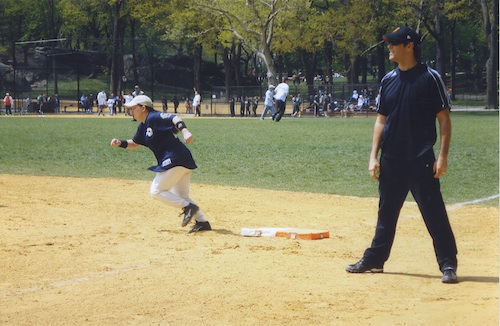
Here I am leaving first base, hopefully going somewhere fast.

Making a play at 2nd. It must have looked like an out judging by the reaction of the crowd when he was called safe (and the incorrect caption this photo received), but I felt his foot hit the bag just before I made the catch, and it was the correct call. But the photo makes it look like a great catch, so it made the website anyway.
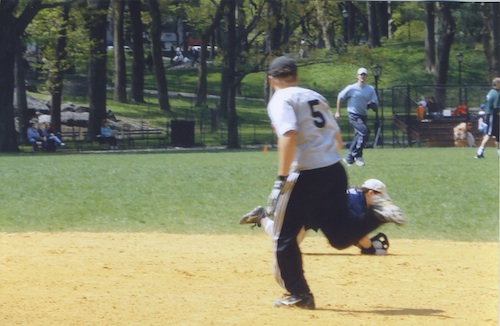
This line drive was one of the last big plays I've made in my very limited play time in recent years, but the runner got in the way of the shot. But at least you can see the ball in the glove. This was against Jersey Boys.

This is probably the best play I've ever made in nearly 20 years of playing organized softball. It was the bottom of the last inning, we were up by 1 run. There was one out. I forget how many men on, probably two. I usually play second base, but for some reason I was catching for part of this game. The batter hit a single into shallow right field. As the runner was coming home, our right fielder threw a perfect fastball directly into my glove and I spun around and tagged the runner on the ass as he was in mid-air diving for the plate. This picture makes it look like I had the ball in plenty of time to make the tag, but if it actually showed the moment of the tag, you would see he was in the air just a couple inches over the plate. There was quite a celebration, but we still had one more out to go, which was a routine grounder. Then we had a big celebration again. At the next game, the league's photographer gave me a print of this photo. He was very happy to have captured it, but not as happy as I was. Also, in the on-deck circle is Jeff Martin, who was in the cast of Hairspray at the time. We went to high school and did many shows together, so it was fun to have the chance to play against each other.
Jeopardy!
I'm a big fan of Jeopardy, but as a theatre person, 7:00PM is not the time I'm usually able to be near a TV, so I really don't watch it much. At the time of this event (probably 2004 or 2005), I was unaware that Jeopardy had something called the Clue Crew. These were a few people who would go out on location to record video questions at the sites they were related to. For a series of musical theatre categories, they wanted to film a bunch of different ones on the set of Phantom. They took this very seriously. I'm not talking about a camera crew showing up at 6:30 and shooting a few minutes before a performance. I mean they kept a sizable portion of the show crew from the time a performance ended until 4AM, recreating entire scenes with the Clue Crew hosts reading the clues as the show basically happened around them. It wasn't the first time I've been in a theatre until 4AM, but it was by far the most exciting and fun, and the only one in which I was glad I wasn't home in bed!
The best clue was the first one we shot. It went something like "The falling chandelier in this musical is based on a real-life incident at the Paris Opera House in 1881." I might have the year wrong on that, but that was the idea. Now maybe you're picturing the host (Jimmy was his name) reading this clue while standing in front of the chandelier. Hoooo no! He read the clue while standing on the apron while the chandelier fell next to him. Of the maybe four hours the whole thing lasted, the chandelier shot took at least an hour of it. I was completely fascinated, because the fall of the chandelier is something that's very hard to observe and understand unless you're one of the people actually involved in it (the actors on stage being "dropped on," the actors behind the curtain paging it, or the two carpenters who act as "chandelier catchers" to help it settle down in the blackout). Because we didn't have the cast there in the middle of the night, it was decided that two stage managers should replace the actors who page the main curtain for the chandelier catchers. I was chosen to page the stage left side of the curtain. Two of the stagehands who normally catch it were there, and gave us a quick tutorial in how best to do it. Because the front tabs are a scrim, you can see the chandelier coming through the closed curtain (which is an awesome perspective, by the way), and they told us how far away the chandelier should be when we start to page, and how far open to pull the curtain (the idea is that the chandelier should hide the curtain opening and the stagehands stepping out, so it can't be too early). We got lots and lots of practice, as they repeatedly dropped the chandelier, checking camera angles, lighting, and so forth. On the third or fourth drop, we broke a string of beads on the bottom, which had to be cut off (it happens from time to time -- I wondered if this night was the most times in a day the chandelier had ever been dropped since tech). It was also really cool to watch how the "crash lights" work. If you've ever sat in the balcony, maybe you've noticed that there are two narrow traps approximately centerstage that form an inverted V shape. The crash lights are mounted on the underside of those traps. They flip up as the chandelier is falling, and provide a very bright flash as it crashes (it's not a pyro effect, as it is at the top of the show, because there are like 10 actors and stagehands all around it at the time, and that would be bad). I also learned from many minutes of standing around, that there were originally four crash lights, because you could see the evidence of where they were mounted. Nobody standing around at the time was able to provide a first-person account of when or why they were removed. It's entirely possible that in 1987 whatever technology was available to produce that much light required four instruments, and they were later replaced with a model that produced twice as much light. I have no idea. Anyway, while the crash lights in themselves are not that exciting, it was interesting to me because they're normally only up for a few seconds, in a situation where you can't see them while calling or decking, and even as an observer, you can't get close to them. And when they go off in your face, they're bright!
In the end after dropping the chandelier countless times (and soon deciding that it didn't need to keep dropping from the ceiling, but from just above the balcony, to be out of the camera shot), they decided the show lighting and strobes were coming out badly on camera, so they made a static light cue for it. Jeopardy later published some photos of their video clues, including this one, which I'm very proud of. My one and only curtain page, captured for posterity, and watched by millions.
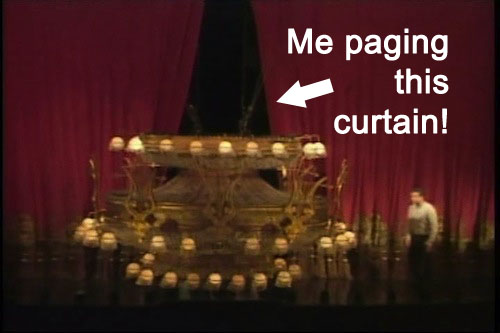
In addition to this very complicated one, they also recreated the journey, with two of the hosts on the boat as the Phantom and Christine, while Jimmy read a clue about Michael Crawford while rowing the boat (something like, "This actor won the 1988 Tony Award for his performance as the Phantom"). I've caught that one on TV a few times. There was also one on the Masquerade stairs (with Jimmy standing among the dummies -- can't remember what the question was), and one on the Don Juan set, which I thought was a little lame, but I think the clue actually referenced it in some way. Anyway, this was one of the most unique and fascinating things that's ever happened to me at the Majestic Theatre.
My Favorite Memories
The Gala
If you'd like to know what is the most interesting thing that's ever happened to me at the Majestic, well that's probably impossible to truly decide. Up there very high was watching almost the entire casts of the Broadway company and the Music Box tour do "Masquerade" on the staircase with about 60 live people, and only the few dummies necessary for safety, at the record-breaking performance. In rehearsal it was just a rehearsal of something very cool, at which it was my job to wrangle both casts and the alumni and original cast. In performance, I went out to the house to watch, and cried. But I was really just a spectator for that. I spent my beloved Overture that night watching from stage right with tons of other cast and crew. After such a long run, it may seem like many people treat it as just a job, but there was a lot of love and pride in that wing that night.
The Ratcatcher
The coolest thing I've ever done, which seems silly, but was awesome, was playing the Ratcatcher during a put-in. The Ratcatcher is seriously the most pointless character in the show. In the novel he's actually given quite a bit of attention, so I guess it's just kind of an homage, even if no one in the audience gets it. Basically the Opera House employs these guys to run around in the basements catching rats. As such, they naturally come into contact with the Phantom and those who are seeking him out. I haven't read the book in probably 15 years, and I don't recall the ratcatchers even having a point or any impact on the plot in the book, other than to be creepy. But when Raoul and Giry are descending to the Phantom's lair, they pass a ratcatcher on the bridge. Giry screams, Raoul jumps back, and removes his hand from the level of his eyes, which Giry admonishes him for, and then tells him to jump in the lake. In stage terms, the Ratcatcher is seen running up the incline of the bridge as the lights come up, banging a stick on the floor, and hops off into the far tower before anyone has any idea what just happened. There was one night when I was watching from the house in my merchandising days, and heard someone nearby say aloud, "What the fuck was that?" I think that's about how much most people get it.
Anyway, at this time, Paul Schaeffer was being put in as a Raoul understudy, and we had spent a while working with the stunt advisor to teach him how to jump into the dive trap. In the progress of those rehearsals, I had watched our dance captain, Harriet Clark, play the Ratcatcher many times, because the cross the Ratcatcher makes past Raoul and Giry is what immediately precedes the jump, so I had observed exactly how it worked -- where they needed to cross, who goes downstage of who, etc. When the day came for his put-in, it was done with full tech, and as we approached the sequence known as Don Juan Panic, I counted up how many actors we had, and who was playing what roles (usually there's only about 15 actors, with the swings and understudies moving between multiple roles as necessary), and calculated that nobody was going to be able to play the Ratcatcher. I was the extra stage manager, not calling or decking, so I said to Bethe, who was on the deck, "we don't have a Ratcatcher, do we?" and she was like, "Do you know it? Go ahead. Get the net, don't bother with the backpack." The Ratcatcher has a stick with a net on it, and a backpack filled with fake rats, which is stored in the travelator tower where he enters. So I quickly crossed the stage and scrambled up the ladder to get ready for my big entrance. Thing Learned #1: the stick is really heavy, and apparently made of steel. WTF? I guess it's durable, it has been smacked on the floor probably about 30,000 times, and I'd bet it's original.
I got ready with my stick, and waited for the proper time. I was so excited to make my Ratcatching debut (actually my debut playing anything in rehearsal), that I didn't think about what I was about to witness from a stage management perspective. Don Juan Panic is rather complicated. The name describes what the characters are doing about as well as what the stage mangers are doing. Just watching Don Juan Panic from the travelator was an awesome experience. The experience for the calling stage manager involves staring intently at a tiny black-and-white screen while trying to observe every piece of moving scenery in view, and listening for the deck SM to tell you about the status of the ones you can't see, which then requires immediate reaction to call more cues. The experience for the deck SM is a lot of squishing up against things, watching, calling, running very quickly to squish against something else, more watching, more squishing, more running, a quick curtain page for the Phantom and Christine, and then once more running and a fast climb two stories up a ladder to jump onto a moving bridge before it's too high for you to get on it. Either way, while you have to know what's happening elsewhere and how all the pieces fit together, you can't ever see it all at once. While waiting for my Ratcatcher entrance, I was suspended in mid-air in the middle of the scene change, as the whole thing happened around me. It was sort of like an out-of-body experience, being able to float above and see everything that was happening, while listening to the calls on headset, so I could relate to exactly where we were in the change, and watch all the cues execute.
Actually playing the Ratcatcher for all 4 seconds of his stage time was fun as well, and I made the cross on the travelator quickly enough that I could jump into the far tower before the bridge had descended too far (Bethe had warned me to stay on the bridge if I wasn't going to make it). It was also my first time ever on the travelator when it's at an angle, which was kind of fun. We're on it a bit during the show, even in view of the audience, but it's always flat at those times. When the transition was done, I waited in the tower for the bridge to raise back up, as I know the Ratcatcher does, because that's where the deck stage manager meets him after the ladder climb, and when the bridge arrived at our level, I crossed it and returned to the stage right tower and hung up my ratcatching net.
Other Interesting Perspectives
Along the same lines as my Ratcatcher experience, I have had other unique perspectives on the show. Around the time of the record-breaking gala, we shot some B-roll footage of a good portion of the show. We did it in the afternoon before an evening show, with full tech. Anyway, I was one of the spare stage managers once again, and as we began, I was standing off to the side of the house with Craig, the PSM, and we saw that one of the curtains in the mezzanine was open, letting light from the hallway in. Craig sent me up to close it (sometimes my front of house experience comes in handy). The timing of this discovery coincidentally meant that the most direct route from where we were standing to the offending curtain resulted in me walking the entire length of the front row of the mezzanine as the chandelier was rising. Now you know how I feel about the Overture. And there I am casually walking from one end of the front row to the other, and I get to center just as the chandelier rises past me and continues above me, which is a perspective that's only possible because I was literally the only person in the balcony.
More Recently
Me with music director David Lai and PSM Craig Jacobs just before places for Phantom's record-breaking performance.
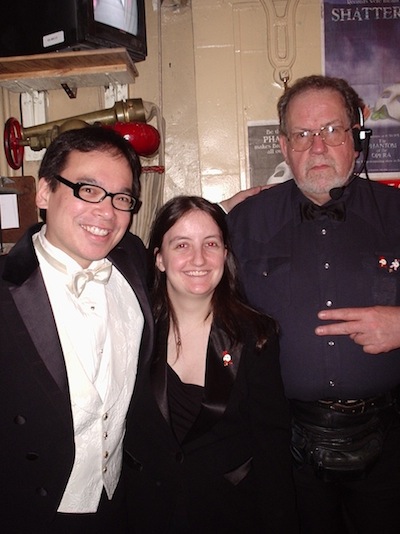
At the calling desk with my friend Shaun, just after a performance. He was calling and I was decking. At least I should hope so, given what we're both wearing.
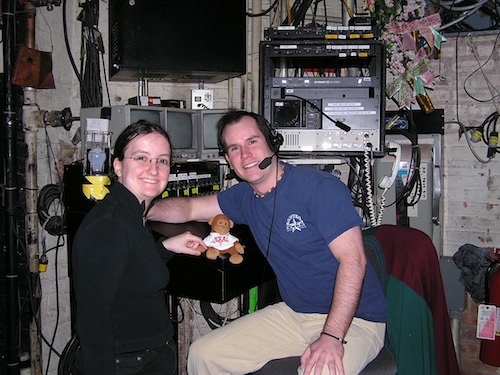
At the Broadway Flea Market, wearing a piece of the chandelier, probably sometime around 2005.
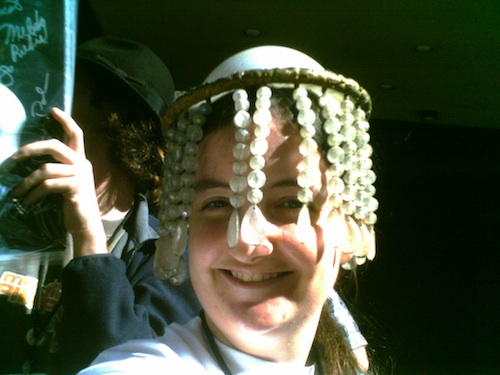
With Hugh Panaro after his (so far) final performance as the Phantom.

Crazy Stuff
I was 12 or 13 when a friend and I made a gingerbread Majestic for Christmas. It was delicious.
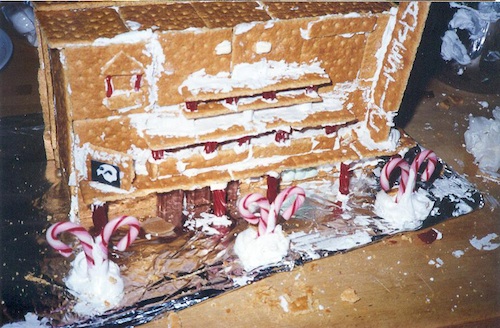
One Final Image
I took this more recently -- my best attempt with a cell phone to capture the quiet creepiness of the Majestic when it's dark, with only the ghostlight to illuminate the chandelier as it floats parked in its overnight position (halfway up, to keep the stage clear, but close enough that it can be reached by the extension cord that lives inside the proscenium stage left, to charge its batteries).
